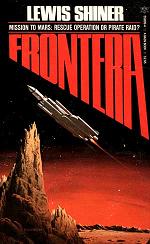
Frontera
Lewis Shiner
182 pages
published in 1984
Looking back at it some twenty years afterwards, cyberpunk did not make half the impression it appeared to make at the time, did it? Unlike the New Wave, which irrevocably transformed science fiction from a cultish obsession into a proper literary genre, all cyberpunk seems to have done is to inject some badly needed glamour at a time when it was sourly missing. Important, yes, but the break between science fiction pre- and post-cyberpunk is much less than that between pre- and post-New Wave science fiction. like so much in the eighties and since, cyberpunk was a manufactured, artificial controversy; the novels and stories the label is slapped on from here seem to fit organically in the wider science fiction genre, only emphasising slightly different things. It all seems a bit embarassing and outdated now, in the way all fashions do when they''re no longer new but not yet old enough to become retro...
What this got to do with Frontera?
Well, Frontera is one of the original cyberpunk novels published in the same year as Neuromancer, by one of the original cyberpunks, Lewis Shiner, who at the time seemed as important a writer as Gibson or Sterling. It is perhaps the quintessential cyberpunk novel. I seem to remember Sterling praising this novel quite a lot as well. As such then it makes a good example of what cyberpunk was all about when it was still a young movement and not yet condemned to live in the shadow of Neuromancer and the books it inspired.
Reading it for the first time twentytwo years after first publication makes for an interesting experience. Frontera is one of those novels I've heard a lot about but which I've had trouble finding until recently, the book apparantely having dropped out of print shortly after the original edition by Baen Books in 1984 and republication by Sphere in the UK in 1985 (the edition I read). Combine that with the high praise that had been heaped upon it over the years and you can imagine I read it with some anticipation, an anticipation that was not completely met. In some ways this reads more like an outline for a novel than a proper novel, with characters more sketched in than developed, a plot that moves slightly too quickly for my tastes and a background that only makes sense if you do not think too much about it.
that background being a staple of late seventies and early eighties science fiction: earth caught in a long lasting economic malaise that has led to the downfall fo govenrments and the rise of the megacoorporations as their replacement, with most people unemployed and kept docile by small benefits and cheap cable tv entertainment. In this case, this happened just when both the Us and the Soviet Union had finally established manned bases on Mars, the US one called Frontera. Now, ten years after the colonies were abandonded with the remaing colonists, a rescue mission is on its way to Mars, to see if anybody is still alive there, or at least to plunder their ruins. As it turns out though the colonists are still very much alive and hiding a secret that could give humanity the stars.
The characters as I said are all sketched out rather than fully developed, all very macho including the women, none of them very nice really. They seem to walk around in a cloud of low level despair, fatigued and weary. It's as if they're all Frank Miller characters.
Does this mean Frontera is a bad novel? I don't think so myself; for me the whole was greater than the parts. However, it's not a classic like Neuromancer or Schismatrix are. It's a credible first novel from somebody who, judged by this had the potential to get much better, thougn unfortunately it seems Shiner has had little succes as a (science fiction) novelist since...
Read more about:
Lewis Shiner,
Frontera,
science fiction,
cyberpunk,
book review